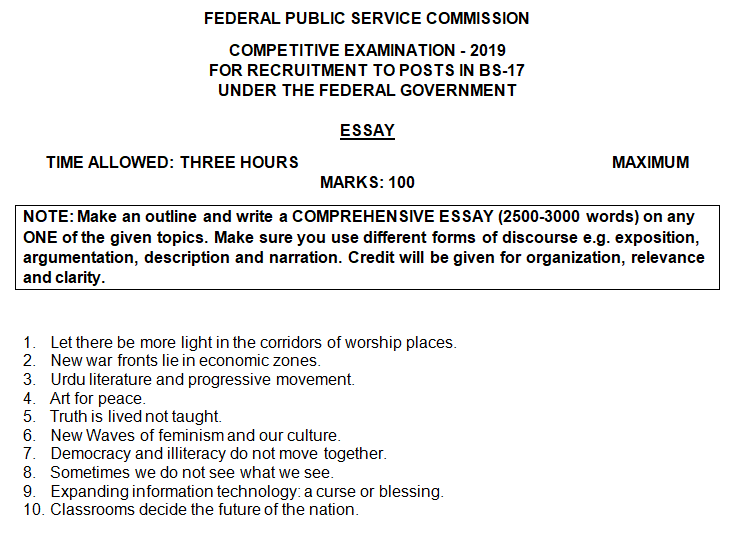CSS Essay Paper 2019
- Let there be more light in the corridors of worship places.
- New war fronts lie in economic zones.
- Urdu literature and progressive movement.
- Art for peace.
- Truth is lived not taught.
- New Waves of feminism and our culture.
- Democracy and illiteracy do not move together.
- Sometimes we do not see what we see.
- Expanding information technology: a curse or blessing.
- Classrooms decide the future of the nation.
Summaries of Essays:
Here are simplified summaries of the additional essays:
1. Let There Be More Light in the Corridors of Worship Places
This essay calls for making places of worship more inclusive, transparent, and open to progressive ideas. The writer argues that religious institutions should not only focus on rituals but also embrace education, critical thinking, and a better understanding of the world. More enlightenment and knowledge should flow from these places to guide individuals and communities.
2. New War Fronts Lie in Economic Zones
This essay discusses how the battlefield of the future may shift from traditional military confrontations to economic zones, where economic power, trade policies, and resource control become sources of conflict. The writer highlights the growing importance of economic stability and resources in global politics, suggesting that economic power struggles may shape the next era of conflicts.
3. Urdu Literature and Progressive Movement
This essay explores the role of Urdu literature in the progressive movement, particularly in South Asia. The writer explains how Urdu writers and poets have contributed to social change by addressing issues such as poverty, inequality, and political corruption through their works. The essay highlights the literary tradition’s role in inspiring progressive ideals and societal reform.
4. Art for Peace
This essay advocates for the power of art as a tool for promoting peace. The writer argues that art—whether through music, painting, or literature—has the unique ability to convey messages of hope, unity, and harmony. The essay emphasizes that art can help bridge cultural divides and encourage peaceful solutions to conflicts.
5. Truth is Lived, Not Taught
This essay suggests that truth is something experienced through actions and life choices rather than just being taught in words. The writer argues that living truthfully and authentically is more impactful than simply learning it intellectually. People must embody truth through their behavior, values, and relationships.
6. New Waves of Feminism and Our Culture
This essay examines the rise of new feminist movements and their impact on traditional cultures. The writer discusses how contemporary feminist ideals challenge established norms and fight for gender equality, especially in societies with deeply entrenched patriarchal values. The essay explores how these movements aim to reshape cultural perceptions of women and their roles.
7. Democracy and Illiteracy Do Not Move Together
This essay argues that democracy and illiteracy cannot coexist effectively. The writer suggests that an informed electorate is essential for the functioning of a democratic system. Without education, citizens cannot make informed decisions, leading to the weakening of democratic processes. The essay calls for greater investment in education to strengthen democracy.
8. Sometimes We Do Not See What We See
This essay reflects on human perception and how biases, assumptions, and preconceptions often cloud our understanding of reality. The writer argues that people frequently fail to see things as they are, because they view them through a distorted lens shaped by personal experiences, culture, and societal influences. The essay calls for greater awareness and self-reflection to better understand the world around us.
9. Expanding Information Technology: A Curse or Blessing?
This essay explores the dual-edged nature of expanding information technology. While it has brought many benefits, such as connectivity, access to information, and innovation, the writer also highlights its potential drawbacks, such as privacy invasion, misinformation, and social isolation. The essay emphasizes the need to balance technological advancement with ethical considerations.
10. Classrooms Decide the Future of the Nation
This essay discusses the critical role of education in shaping a nation’s future. The writer argues that the quality of education, particularly in classrooms, directly impacts the socio-economic development, innovation, and progress of a country. The essay calls for reform in education systems to ensure that students are equipped with the skills and knowledge needed to drive the nation’s success.
